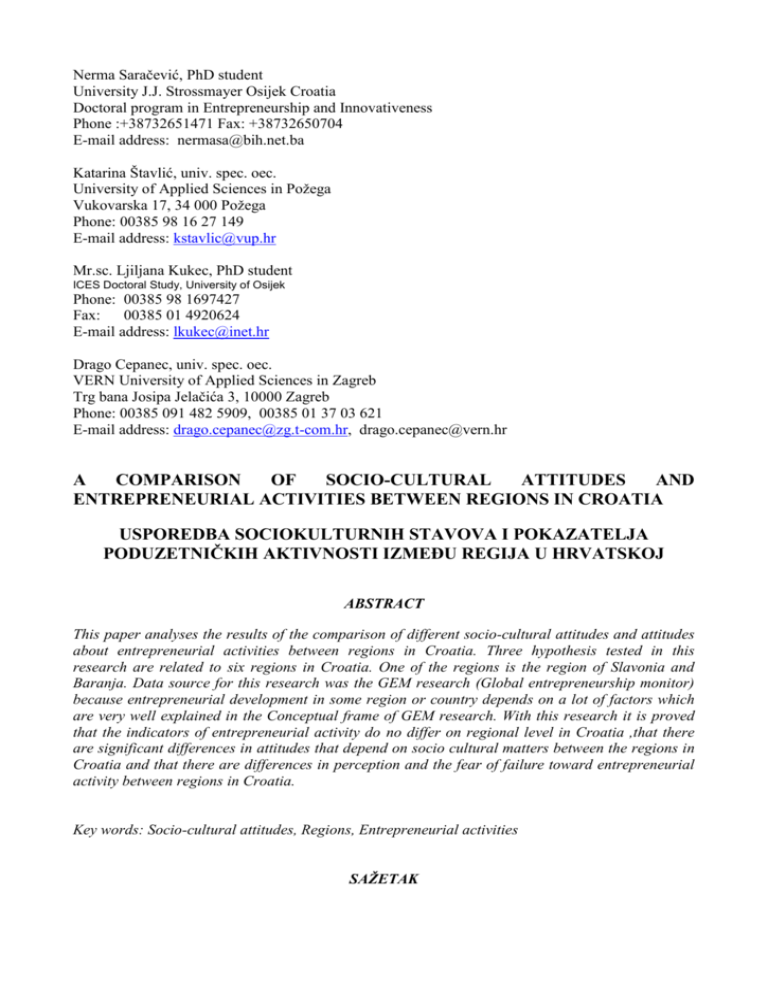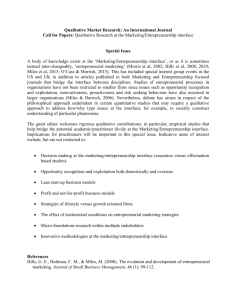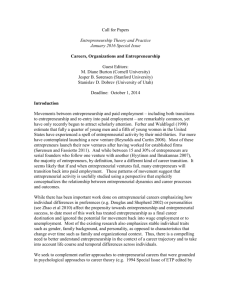Name and academic title of the first author
advertisement

Nerma Saračević, PhD student University J.J. Strossmayer Osijek Croatia Doctoral program in Entrepreneurship and Innovativeness Phone :+38732651471 Fax: +38732650704 E-mail address: nermasa@bih.net.ba Katarina Štavlić, univ. spec. oec. University of Applied Sciences in Požega Vukovarska 17, 34 000 Požega Phone: 00385 98 16 27 149 E-mail address: kstavlic@vup.hr Mr.sc. Ljiljana Kukec, PhD student ICES Doctoral Study, University of Osijek Phone: 00385 98 1697427 Fax: 00385 01 4920624 E-mail address: lkukec@inet.hr Drago Cepanec, univ. spec. oec. VERN University of Applied Sciences in Zagreb Trg bana Josipa Jelačića 3, 10000 Zagreb Phone: 00385 091 482 5909, 00385 01 37 03 621 E-mail address: drago.cepanec@zg.t-com.hr, drago.cepanec@vern.hr A COMPARISON OF SOCIO-CULTURAL ATTITUDES AND ENTREPRENEURIAL ACTIVITIES BETWEEN REGIONS IN CROATIA USPOREDBA SOCIOKULTURNIH STAVOVA I POKAZATELJA PODUZETNIČKIH AKTIVNOSTI IZMEĐU REGIJA U HRVATSKOJ ABSTRACT This paper analyses the results of the comparison of different socio-cultural attitudes and attitudes about entrepreneurial activities between regions in Croatia. Three hypothesis tested in this research are related to six regions in Croatia. One of the regions is the region of Slavonia and Baranja. Data source for this research was the GEM research (Global entrepreneurship monitor) because entrepreneurial development in some region or country depends on a lot of factors which are very well explained in the Conceptual frame of GEM research. With this research it is proved that the indicators of entrepreneurial activity do no differ on regional level in Croatia ,that there are significant differences in attitudes that depend on socio cultural matters between the regions in Croatia and that there are differences in perception and the fear of failure toward entrepreneurial activity between regions in Croatia. Key words: Socio-cultural attitudes, Regions, Entrepreneurial activities SAŽETAK U radu se analiziraju rezultati usporedbe različitih društveno-kulturnih stavova i stavova o poduzetničkim aktivnostima među regijama u Hrvatskoj. Tri hipoteza testirane u ovom istraživanju odnose se na šest regija u Hrvatskoj. Jedna od regija je regija Slavonije i Baranje. Izvor podataka za ovo istraživanje je GEM istraživanje (Global Entrepreneurship Monitor), jer poduzetnički razvoj neke regije ili zemlje ovisi o puno faktora koji su jako dobro objašnjeni u konceptualnom okviru GEM istraživanja. Istraživanje u ovom radu je pokazalo da se pokazatelji poduzetničke aktivnosti ne razlikuju na regionalnoj razini u Hrvatskoj, da postoje značajne razlike u stavovima ovisnosti o društveno kulturnim pitanjima između regija u Hrvatskoj, te da postoje razlike u percepciji i strahu od neuspjeha prema poduzetničkim aktivnostima između regija u Hrvatskoj. Ključne riječi: društveno-kulturni stavovi, regije, poduzetničke aktivnosti 1. Introduction In the last decades entrepreneurship has been the topic of lot of research because of its driving force on the national economies. Entrepreneurship is the phenomenon that has to be seen from many research fields, such as psychological, sociological, economic, cultural, political etc. The development of entrepreneurship depends on historical development, existence of social, economic and financial structure that support entrepreneurship and on entrepreneurial tradition in the country. In the 90 ies in almost all parts of the world a more dynamic entrepreneurial activity was noticed thanks to the establishment of the entrepreneurial support structure, educational structure as well as more dynamic research activities all over the world. That is not a surprise because entrepreneurship is considered the main wheel of economic growth. That is the reason why it became an important discipline at universities and business schools. Also, thanks to the fact that it was recognize on behalf of the governments as an active factor in employment its great contribution to national economy was awaked (Kukec, 2009). These were best emphasized in 2003, in the document “Green Paper “of the European Commission which spoke about the future of entrepreneurship in Europe and pointed that building an entrepreneurial society involves everybody. Positive attitudes towards entrepreneurial initiative and failure can help develop entrepreneurial ventures. Furthermore, entrepreneurship can be applied to achieving social and societal objectives. Considering all of this, it is not surprising that there is a lot of literature analysing entrepreneurial activities and entrepreneurial framework in general. But the importance of equal regional development in each country plays an important part in the research which is the subject of scientific research as well as governmental policies. In the political and economic frame of EU equal regional development has great importance, which can be seen in Articles 158 to 162 of the Treaty establishing the European Community (EC) (Title XVII), established by the Single European Act as “Economic and social cohesion, as defined by Article 158, is needed for the Community’s ‘overall harmonious development’ and requires a reduction of the ‘disparities between the levels of development of the various regions’, i.e. the ‘backwardness of the least favoured regions’, which include rural areas.“ As result of these policies national and regional entrepreneurial development are equally important on the level of each country. Given that entrepreneurship is a very significant factor of regional development, it is necessary to approach its development systematically, with measures of regional politics, which means to create conditions for the development of entrepreneurial activity on the regional level. In this article we try to identify the differences in entrepreneurial activities and socio-cultural attitudes regarding entrepreneurial activity in six Croatian regions. As it will be shown in the analysis, there are significant differences between the regions in regard to the level of entrepreneurial activity, as well as socio-cultural attitudes towards entrepreneurship. GEM database is the only source based on which analysis can be performed to confirm that there are differences between regions. 1.1. Contextual background and literature review How does national culture relate to levels of entrepreneurial activity? This question is motivated by the observations of economists (e.g., Schumpeter, 1934), sociologists (e.g., Weber, 1930), and psychologists (e.g., McClelland, 1961) that countries differ in levels of entrepreneurial activity. Entrepreneurial activities are considered an important source of technological innovation (Schumpeter, 1934) and economic growth (Birley, 1987). Therefore, understanding the influence of national culture on entrepreneurship is of considerable theoretical and practical value (J.C.Hayton, G. George, Shaker A. Zahra, 2002.) In the literature culture a set of shared values, beliefs and behaviours is usually defined. It is not conscious and it is deeply implanted in the life of every individual. Political, institutional, social and historical environment create the culture and beliefs which strongly influence all individual and group decisions and behaviour. That means that culture strongly influences a degree to which a country or region considers entrepreneurial initiative, risk taking as a desirable carrier and by that strongly influences on self-confidence of the individual and on their decision to start the enterprise. (J.C.Hayton, G. George, Shaker A. Zahra, 2002) The influence of culture on entrepreneurship has been of great interest of the scientists for the past years and the liaison between national, regional, organisational, institutional etc. cultures has been determined as an important factor in entrepreneurial activity, and the encouragement of innovation and in risk-taking. That is one of the reasons of our interest in socio- cultural factors in entrepreneurial development of Croatian regions and risk-taking culture in the same way as well. It is not questionable that differences in Croatian regions on the sociological, economic, political, geographical, historical etc. aspects are on one hand the fortune for Croatia in general but the importance of coherent economic development in this moment of adhesion of the EU is of great importance too, not only to adhere to EU policies but to establish a good position in order to benefit from as many EU funds for regional development as possible. Along with GEM, Polona Tominc and Miroslav Rebernik (2007) hada great influence by establishing the factors that might determine the growth aspirations of the early stage of entrepreneurs in different countries including (amongst others): (1) opportunity recognition, (2) cultural support for entrepreneurial motivation, and (3) self-confidence in skills, knowledge and experience, needed for entrepreneurship. One of the defining characteristics of an entrepreneur is the specialization in judgmental decisionmaking (Casson, 2005), which is not culture-neutral. An individual’s personal perceptions and judgments about the existence of opportunities, about the acceptance of entrepreneurial behaviour in society and about her/his skills are often formed on the basis of shared norms and values in the relevant society; they are often biased, but nevertheless influence the individual’s entrepreneurial plans and actions. Some other authors like Liao and Welsch (2003) claim that a higher degree of motivation for entrepreneurship can be expected in those societies where entrepreneurship is socially acceptable behaviour. Some researchers like Hofstede (2004) claim that dissatisfaction with society and with life in general can be a strong motivation for entrepreneurship, because people are attracted to selfemployment and entrepreneurship because they expect that it will provide not only the financial compensation but also social status and respect. On one hand one important dimension of culture is also the extent to which a culture stigmatizes1 entrepreneurial failure and this problem is associated with environmental dynamism which can moderate the relationship between culture, stigma, and entrepreneurial risk-taking by affecting the dimensions of stigma. According to N. L. Damaraju, J. Barney and G.Dess (2010), it has been suggested that in collectivistic cultures and in cultures with high levels of fear of insecurity, the fear of stigma associated with entrepreneurial failure leads to relatively low levels of entrepreneurial activity (Hofstede, 1980; Hofstede et al, 2002; Hayton, George and Zahra, 2002; McGrath, 1999). On the other hand, in cultures characterized as more individualistic, with less fear of insecurity there are lower levels of stigma associated with business failures and it is generally more conducive to entrepreneurial activity (Begley and Tan, 2002; Lee, Peng and Barney, 2007). The important impact on growth of entrepreneurship also leads to the discussion that a higher level of motivation for entrepreneurship also depends on self-confidence in one’s own skills and competences to lead an entrepreneurial activity. Authors that were dealing with this field are Shave and Scott, who in 1991 claimed that the person should have the capacity, skills, knowledge and motivation to turn opportunities to sustainable business. Psychology literature dealing with this theme of self-efficacy states that an individual with high self-efficacy for a given task in this case of entrepreneurial activity will also set and accept higher goals. (Bandura, 1997; Baron, 2000) On the other hand, it is logical that in all circumstances failure is met with socio-psychological consequences. People who fail are often labelled as losers and this has a big impact on self-esteem and self-confidence, which can have great consequences on entrepreneurial behaviour. 1.2. Croatian facts So, it is not surprising that the facts quoted in a paper by S. Letinić and K. Štavlić (2011) showed that the accession to the European Union imposes some new favourable developmental opportunities for Croatia. Each of the regions in Croatia has certain advantages which should be used in order to achieve better levels of competitiveness. The implementation of comparative analysis of indicators of Croatian entrepreneurs, on the regional level, has shown that there are great differences in regional development. Such a situation has, with other key factors of regional development, influenced on long-term tendency of negative indicators of entrepreneurial activity on the global level of Croatia. Table 1. The main macroeconomic indicators and indicators of entrepreneurial activity in Croatia for 2010. Indicators Croatia The number of entrepreneurs in the private sector, % of total number of entrepreneurs 97,9 The number of small and medium entrepreneuers, % of total number of entrepreneurs 99,4 TEA 10 5.53 TEA 10 male 7.15 TEA 10 female 3.91 TEA opportunity 3.52 TEA necessity 1.78 SUSKIL 10 male 62.62 SUSKIL 10 female 43.92 GDP per capita (USD) 13.750 GDP, real growth rate in % -1,4 Unemployment rate 17,4 1 Meaning of the Greek word Stigma (mark, sign) evolved its form from Antic times toward nowadays but always meant a combination of fear, prejudice and ignorance that affect the individual in a negative way exposing him/her to social insecurity or disapproval of the community. Average monthly paid off net earnings (KN) Source: own work of the authors 5.343 We can conclude looking at the data in Table 1 that this statement is based on data among which the Index of entrepreneurial activity points lack of entrepreneurial spirit and environment in Croatia. Also, we can see a high percentage of 97.9% of private entrepreneurs, and small and medium businesses 99.6 compared to the total number of enterprises in Croatia in 2010. Small and mediumsized enterprises are considered to be a generator of economic growth and development, to promote employment and production and it can be concluded that the factors that affect the operations of enterprises and a large number of entrepreneurs do not necessarily mean the economy is in the phase of growth. Some of the factors are high taxes, the existence of gray market, a large number of outstanding claims, etc. In Croatia there are high tax rates and non-fiscal taxes and the share of grey market in Croatian GDP is 30.1%. By avoiding paying taxes the share of grey market increases, and there is also a great insolvency in business making. The amount of unexecuted payment bases in Croatia in 2011 was as high as 36.7 billion kn. Almost 85% of unexecuted obligations go to entrepreneurs blocked longer than 360 days. This is the reason why Croatia is positioned badly in the Index of global competitiveness and business sophistication. Also, the Table shows that in terms of reduced economic growth and high unemployment in the Republic of Croatia, there are a large number of small and medium enterprises. They constitute 99.4% of the total number of entrepreneurs. Entrepreneur men are more active than women, and 62.62% of the male population is considered to have the necessary skills and abilities to become entrepreneurs, while there is a lower percentage of women who agree with this statement. Beside all this it is important to mention that except the different historical context of some Croatian regions, different influences and in some parts different culture and underdevelopment direct our research into the hypothesis we made, but one study has given us a broader perspective of the situation in Croatian regions. According to GEM classification there are six regions in Croatia: 1. Zagreb Region, 2. Northern Croatia, 3. Slavonia and Baranja 4. Lika and Banovina, 5. Istria, Primorje and Gorski kotar and 6. Dalmatia. The indicators of entrepreneurial activities on the national level of Croatia are analyzed in the paper, taking into consideration the results of referent research. The paper focuses on national and regional entrepreneurial framework that influences attitudes, beliefs and behaviours of the people in Croatia regions. Before our analysis if there are differences in attitudes connected with socio-cultural matters between regions and if there are differences in entrepreneurial activities among the regions in Table 2, there are a some macroeconomic indicators for the whole country and for the regions. Table 2. The main macroeconomics indicators for Croatian Regions Size in Population Total % of Average GEM km2 2010 persons in employment Unemploy REGION 2010 employment from whole ment 2010 population rate in 2010. 3718 1.122.113 428.464 38,18 % 12,6 % ZAGREB & SURROUND ING 12219 349.015 74.289 21,29 % 24,76 % LIKA & BANOVINA 10448 766.063 145.716 19,02 % 27,68 % SLAVONIJA & BARANJA 6403 518.458 152.605 29,44 % 10,85 % ISTRA, PRIMORJE, GORSKI KOTAR 9613 762.539 168.266 22,07 % 19,76 % NORTH GDP per capita in 2007. (EUR) 12.063 Average monthly gross earnings in 2010 (Kn) 8.307,50 Average monthly paid off net earnings in 2010 (kn) 5.611,00 7.688 7.031,00 4.982,33 6.370 6.439,75 4.618,00 11.820 7.513,00 5.243,00 7.617 6.221,16 4.444,00 CROATIA 12943 DALMATIA Source: CBS Croatian 896.593 197.467 22,03 % 18,48 % 8.456 7.189,50 In Table 2 the differences between the regions according to their area, population and the macroeconomic indicators are shown. According to the presented data we can conclude that the most developed regions are: Zagreb and surroundings, and Istria, Primorje and Gorski Kotar, while the less developed are Slavonia and Baranja region and Northern Croatia. The existence of regional differences in entrepreneurial activities will be further analyzed and shown through the following tables. 2. Research question and hypothesis As we have described in the previous section, the growth of entrepreneurial activities can be the consequence of socio-cultural differences that have an impact on entrepreneurial activities and risktaking attitudes in some economies. Based on that the research questions arise, trying to prove if there is a connection between socio-cultural differences in Croatian regions and the differences in entrepreneurial activities and risk-taking attitudes as well. Comparing the differences in attitudes regarding entrepreneurial careers, status, reputation and a possible start-up in the next six month on entrepreneurial activity in six Croatian regions we have made the first hypothesis. The second one regards the connection between indicators of entrepreneurial activities and the regions, what means we tried to find out if there is a difference in entrepreneurial activities on the regional level. With the third hypothesis we tried to prove if there are differences between the perception and courage of/for entrepreneurial activities on the regional level in Croatia. H1: The indicators of entrepreneurial activity differ on the regional level in Croatia H2: There is a difference in socio-cultural attitudes between regions (career, status, media coverage, perception of opportunity) H3: There is a difference in personal attitudes (suskil, fear of failure) between regions We predicted that more developed regions have a higher level of entrepreneurial activity and a higher proportion of positive socio-cultural attitudes on entrepreneurial activity. 3. Methodology 3.1. Data Entrepreneurial development in some region or country depends on a lot of factors which are very well explained in the Conceptual frame of the GEM research (Global entrepreneurship monitor) which was the base for this research as well. GEM is a set of comprehensive research which started in 1999 and until 2010 covered over 175 000 surveyed people from 59 economies. Participating countries cover over 52% of the world’s population and 84% of the world’s GDP. (GEM 2010) This is broad, comparable and standardized data about entrepreneurial activities and whole framework, institutional, sociological and cultural factors that influence it. 5.056,25 Data source in the GEM study was a randomly chosen sample of the adult population aged 18 to 64, where the sample size was 2000 respondents in Croatia and a minimum 36 experts. Postulates tested in this research are related to six regions in Croatia: 1. Zagreb Region, 2. Northern Croatia, 3. Slavonia and Baranja 4. Lika and Banovina, 5. Istria, Primorje and Gorski kotar and 6. Dalmatia. The time framework for the research is the year 2010. The six regions correspond to different counties as shown in Table 2. 3. Allocation of Croatian counties by GEM report ZAGREB SURROUNDING City of Zagreb County of Zagreb ALLOCATION OF CROATIAN COUNTIES IN GEM REGIONS AND SLAVONIA AND BARANJA NORTH CROATIA LIKA AND BANOVINA County of Karlovac County of Lika-Senj County of Sisak-Moslavina County of Slavonski Brod-Posavina County of Osijek-Baranja County of Požega-Slavonia County of Vukovar-Sirmium ISTRA, PRIMORJE, GORSKI KOTAR County of Istria County of Primorje-Gorski kotar County of Bjelovar-Bilogora County of Krapina-Zagorje County of Koprivnica-Križevci County of Međimurje County of Varaždin County of Virovitica-Podravina DALMATIA County of Dubrovnik-Neretva County of Split-Dalmatia County of Šibenik-Knin County of Zadar Source: GEM Croatia 3.1. Variables and methods Table 4. Variables Variable code Entrepreneurial activity TEA 10 Social attitudes EqualI10 NBGOOD10 NBSTAT10 NBMEDI10 OPPORT10 Personal attitudes SUSKIL10 FRFAIL10 Description Categories Frequency Involved in Total early-stage Entrepreneurial Activity Yes=1 No=0 1=5,53% 0=94,47% In my country, most people would prefer that everyone has a similar standard of living. Yes=1 No=0 1=73,04% 0=22,94% In my country, most people consider starting a new business a desirable career choice. In my country, those successful at starting a new business have a high level of status and respect. In my country, you will often see stories in the public media about successful new businesses. In the next six months, will there be good opportunities for starting a business in the area where you live. Yes=1 No=0 1=60,59% 0=30,17% Yes=1 No=0 1=44,69% 0=44,44% Yes=1 No=0 1=38,09% 0=53,93% Yes=1 No=0 1=19,61% 0=64,17% Have the knowledge, skill and experience required to start a new business. Fear of failure would prevent you from starting a business? Yes=1 No=0 1=50,09% 0=44,44% Yes=1 No=0 1=38,91% 0=60,97% Source GEM Croatia 2010 I/ To prove the first hypothesis we analyzed the indicators of entrepreneurial activities in Croatia regions. II/ To confirm the second hypothesis we analyzed the variables by which the differences in attitude depending on socio-cultural matters between the regions were described. The perception of sociocultural differences between the regions is measured on the sample of the adult population between 18-64 years old, which answered the following questions: - Do most people in your country prefer that everyone have a similar standard of living? - Do most people in your country consider starting a new business a desirable career choice? - Do those successful at starting a new business have a high level of status and respect? - Do you often in your country see stories in the public media about successful new businesses? - In the next six months, will there be good opportunities for starting a business in the area where you live? III/ To prove the third hypothesis we analyzed variables by which the difference in perception of entrepreneurship and courage to start the entrepreneurial activity was examined. The perception of entrepreneurship and the courage to start it on the regional level was measured on a sample of the adult population between 18-64 years old, who answered the following questions: - Do you have the knowledge, skill and experience required to start a new business? - Would the fear of failure prevent you from starting a business? The methodology used for proving these hypotheses is the chi square and descriptive statistics. 4. Results and discussion The first hypothesis: We tested whether the indicators of entrepreneurial activity differ on a regional level in Croatia? Table 5 presents indicators of entrepreneurial activity by region. Through the results of chi-square test we can see that there are no regional differences in the presented indicators of entrepreneurial activity. Table 5. Indicators of entrepreneurial activity in Croatian Regions Zagreb region Norther Slavonia Lika and mean n mean Banovina (in %) Croatia (in %) mean mean (in %) (in %) TEA 10 7.06 Source: own work of the authors 4.61 3.95 6.04 Istria and Kvarner mean (in %) Dalmatia mean (in %) Chi – square (significance) 6.01 5.18 3.920 (0.560) Although there are no differences in the TEA index, it can be observed that the TEA is higher in those regions with higher GDP. The second hypothesis: We tested whether there is a difference in the socio-cultural attitude between regions (career, status, media coverage, perception of opportunity)? Analyzing the differences in socio-cultural attitudes between regions (the results are shown in Table 6) we can conclude that there are differences between regions in attitudes that everyone should have a similar standard of living, in perception of stories in the public media about successful new businesses and about attitudes that there will be good opportunities for starting a business in the area where they live. There are similar attitudes about considering that starting a new business is a desirable career choice and that successful entrepreneurs have a high level of status and respect. Table 6. Percentage of adults that answered YES to the five questions – Cultural and social attitudes about entrepreneurship Zagreb Northern Slavonia Lika and Istria and Dalmatia region Croatia mean Banovina Kvarner mean mean mean (in %) mean mean (in %) an Chi – square (significa (in %) Most people in 72.59 your country prefer that everyone has a similar standard of living Most people in 65.92 your country consider starting a new business a desirable career choice Those successful at 48.47 starting a new business have a high level of status and respect? You often see 37.10 stories in the public media about successful new businesses in your country? In the next six 25.17 months, there will be good opportunities for starting a business in the area where you live Source: own work of the authors (in %) (in %) (in %) nce) 74.91 74.49 82.21 81.70 73.23 9.553 (0.088) 66.46 70.58 72.03 64.84 65.50 3.610 (0.606) 53.48 51.62 54.76 41.95 49.78 7.141 (0.210) 47.85 46.40 34.95 40.74 41.67 12.182 (0.032) 23.67 16.95 9.72 26.93 29.74 24.174 (0.002) There are significant differences in some attitudes depending on socio-cultural matters between the regions in Croatia and we are partially confirming our second hypothesis. It was observed that a balanced lifestyles is one of the most important reasons for the region to have a higher standard of living. At least two regions of Northern Croatia and Slavonia, which also have the same number of people, have developed relatively the same attitude. In contrast, the regions of Lika & Banovina and Istira & Kvarner consider a similar standard of living very important. These two regions have the lowest number of inhabitants and this can be assumed to be in respect to the same social and cultural attitudes. The number of inhabitants and attitudes of a balanced standard of living should be investigated in future research. Surprising results of the chi-square test show that attitudes considering starting a new business as a desirable career choice and about being successful at starting a new business have a high level of status and respect, and, noticeably, that there are no significant differences between regions, but the attitude of the high level of status and respect for people who are starting a business is very low. Comparing the attitudes about writing stories in the public media about successful new businesses confirms that there are differences between regions. The lowest percentage of positive responses is in the region of Lika & Banovina, but a low percentage of positive responses is in the most developed region of Zagreb. Comparing them to the region of Slavonia, we can conclude that in the least developed region, there is a higher level of promotion of entrepreneurial activities. According to the results obtained regarding good opportunities for starting a business in the area where they live, we confirm that there are differences between regions. The lowest level of expectations of good opportunities to start a new business is in the regions of Lika & Banovina and Slavonia. This is an important indicator as to the measures to be taken for raising level of entrepreneurial activity in these regions Third hypothesis: We wanted to determine whether there is a difference in personal attitudes (suskil, fear of failure) between regions? For testing the third hypothesis there are following results in Table 7. Table 7. Percentage of adults who answered on these two questions Zagreb Northern Slavonia Lika and region Croatia mean Banovina mean mean (in %) mean (in %) (in %) (in %) Fear of failure could 34.15 prevent you from starting a business Has knowledge, skill and 54.49 experience required to start a new business Source: own work of the authors Istria and Kvarner mean (in %) Dalmatia mean (in %) Chi – square (significance) 44.54 38.93 45.26 40.43 38.12 10.330 (0.066) 48.91 49.40 49.41 57.64 57.99 8.632 (0.124) We can also see a relationship between the claims that the fear of failure has an influence on becoming an entrepreneur and having the necessary knowledge, skills and experience to run it. There is a connection between the fear of failure and the region, and there is no relationship between suskil and regions. The data indicate that in the observed regions that have a higher percentage of people with knowledge simultaneously have a smaller percentage of people who believe that their fear of failure prevented them from starting ventures. Our results suggest that there are differences between regions in entrepreneurial activities and attitudes that everyone should have a similar standard of living, in perception of stories in the public media about successful new businesses and about attitudes that there will be good opportunities for starting a business in the area where they live. There are similar attitudes about considering that starting a new business is a desirable career choice and that the successful entrepreneurs have a high level of status and respect. 5. Conclusion In this paper we compared different socio-cultural attitudes and attitudes about entrepreneurial activities between regions in Croatia. We set three hypotheses with which we proved that the indicators of entrepreneurial activity are do not differ on the regional level in Croatia, that there are significant differences in attitudes depending on socio-cultural matters between the regions in Croatia and that there are differences in perception and the fear of failure toward entrepreneurial activity between regions in Croatia. Further aspects of the research should be focused on determining the cause of significant differences in the second and third hypothesis, i.e. to determine why the attitudes about social and cultural issues between regions vary by county, and why there are significant differences in the perception of the fear of failure towards entrepreneurial activities between regions. Determining these answers will provide guidance for further action in terms of creating a better environment for the growth of entrepreneurial activities. As each country aspires to a balanced development, it is suggested that each region in the country has a balanced growth and development. In this sense, ministries and institutions have the greatest roles . Various programs for the development and policies for the implementation of the programs coordinated with regional characteristics and estimated differences encourage entrepreneurial activity, raise the level of knowledge and skills, with the aim of strengthening the entrepreneurial knowledge and reducing the fear of failure. By the aforementioned measures a balanced growth and development would be achieved in the long term through regional development agencies and institutions of higher education and research. Entrepreneurial activity is shaping many factors including family environment and a larger culture in which businesses increase the quality of their formal and informal education, work experience and their exposure to the media. Policy intervention in any of these areas are likely to have the effect of two stages: a direct effect, such as the educational policy of introducing entrepreneurship education in schools, to promote a change in attitudes in the short term, and an indirect effect in which a change in individuals attitudes will impact a wider social and cultural attitudes in this economy. in the long run. Croatia could have a role in this context in three ways: as a catalyst (for the collection and dissemination of good practices) in all counties, as a platform provider to stakeholders to discuss issues, and as a promoter mobilizing resources to improve entrepreneurship education in Croatia. References Bandura, A., (1997)‘Self-Efficacy: The Exercise of Self-Control, Freeman, New York Baron,R., (2004),‘The Cognitive Perspective: A Valuable Tool for Answering Entrepreneurship’s Basic ‘‘Why’’ Questions’,Journal of Business Venturing 19, pp. 221–239 Brown T.E. and Ulijn J.(eds.), Role in Entrepreneurship: Self-Employment Out of Dissatisfaction’, Innovation, Entrepreneurship and Culture, Cheltenham, UK: Elgar De Pillis,E. (1997), What's achivement got to do with it? The role of national culture in the relationship between entrepreneurship and achievement motivation, University of Hawaii, Hilo School of Business Damaraju, N.L. et al: (2010) Stigma and entrepreneurial risk taking, Summer Conference 2010 On "Opening Up Innovation: Strategy, Organization and Technology" at Imperial College London Business School, June 16 - 18, 2010 Hofstede, G.et al: (2004), ‘Culture’s role in Entrepreneurship: Self-Employment Out of Dissatisfaction’ in T. E. Brown and J. Ulijn (eds.), Innovation, Entrepreneurship and Culture, Cheltenham, UK: Elgar Hwang H., Powell W., (2005) “Institutions and entrepreneurship, The handbook of Entrepreneurship research”, Kluwer Publishers, 5, pp 179-210 Hayton J.C. et al: (2002) National Culture and Entrepreneurship: A Review of Behavioral Research, Entrepreneurship: theory and practice, Vol 26 Kukec Lj.,Challenges for Franchise Development in the Croatian market", Faculty of Economics, University of J. J. Strossmayer, Osijek, Croatia, Master thesis Letinić S., Štavlić K. (2011), Entrepreneurial Activity - Indicator of Regional Development in Croatia, World Academy of Science, Engineering and Technology pp 77 Liao, J. and Welsch H., (2003), ‘Social Capital and Entrepreneurial Growth Aspiration: A Comparison of Technology and Non-technology-based Nascent Entrepreneurs’, Journal of High Technology Management Research 14, pp 149–170 Pheifer S.,.Šarlija N., (2005) Benchmarking Entrepreneurial framework conditions among GEM countries, 6th International conference of Enterprise in transition, Bol Shaver, K. G. and Scott L.R., (1991), ‘Person, Process, Choice:The Psychology of New Venture Creation,’, Entrepreneurship Theory and Practice 16(2), pp 23–45 Tominc P., Rebernik M.,(2007) Growth aspirations and cultural support of entrepreneurship a comparison of post socialist countries, Small business economics pp 28 Wennekers S. et al: (2005) Uncertainty avoidance and the rate of business ownership across 22 OECD countries, 1976-2000, paper prepared for the International Workshop on Entrepreneurship and Culture, Max Planck Institute of Economics in Jena D. Kelley,N.Bosma, J.E.Amoros, GEM 2010 Global report) www.gemconsortium.org (accesed May 2012)






